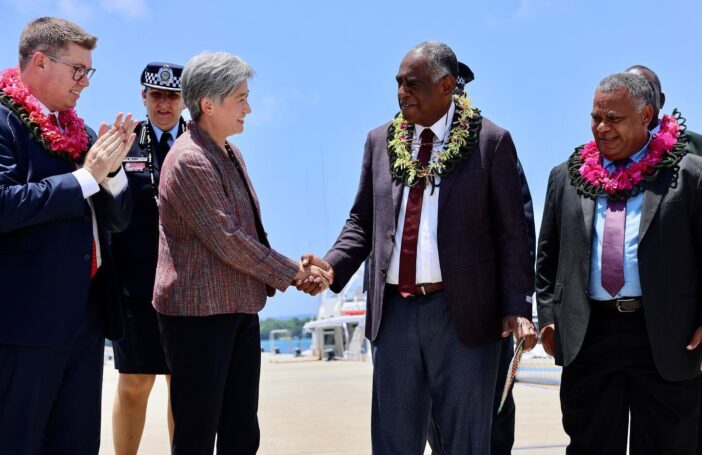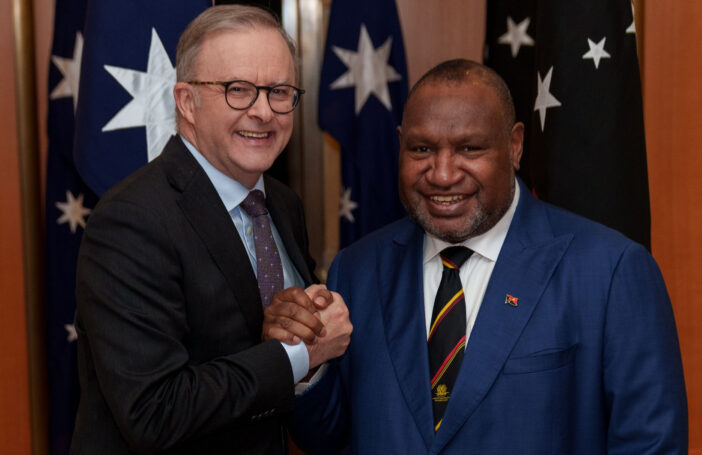Towards the end of Indonesian President Joko Widodo’s tenure, he and Papua New Guinean Prime Minister James Marape stepped up cross-border cooperation between Indonesia and PNG by signing four Memoranda of Understanding (MoUs), on 15 July 2024.
Two of the MoUs are particularly attention-grabbing: the agreements on Cross-Border Movement for Commercial Buses and Coaches, and on Cross-Border Transport of Goods by Motor Vehicles. They are unprecedented in the history of bilateral relations between Indonesia and PNG, overcoming a long-standing reluctance to permit public transport across the border. However, the agreements are limited to the cities of Jayapura and Vanimo, located on either side of the border in the northern part of New Guinea.
These MoUs undoubtedly pave the way for increased cooperation between the two countries, offering significant benefits to the people living in Jayapura and Vanimo, who now have access to public transport for crossing the border.

From a regional perspective, these agreements reflect Indonesian foreign policy under the Jokowi administration, which sought to strengthen ties with the Pacific community, with PNG serving as a notable example. From a local perspective, this breakthrough marks a significant step in the sister-city cooperation between Jayapura and Vanimo, which has been renewed for a second term since 2016.
While this breakthrough represents progress, several challenges remain. First, road conditions pose a challenge, particularly on the PNG side, between the Wutung border post and Vanimo city, a journey which takes approximately 1.5 hours by taxi. Several bridges along this route are susceptible to river water flowing over the upper surface — worse during the rainy season — which can make driving hazardous for those without the special skills to navigate safely.
Another important consideration is transnational crime. Local news often reports on smugglers transporting marijuana from Vanimo to Jayapura using unofficial land routes, boats, or even attempting to cross via the official border posts. While we often hear about those who are apprehended, there is concern about those who slip through. With these MoUs increasing interaction between the two communities and making cross-border public transport more frequent, security measures need to be strengthened — both before boarding public transport and at the border — to deter smugglers effectively.
The new cross-border public transport agreement will significantly increase the flow of people. An increased number of individuals from PNG will travel to Indonesia through Jayapura for various reasons, including family visits and sightseeing — though shopping will likely be the primary allure. The Skouw market at the border is already a popular destination, and this new cross-border transport option is expected to attract even more PNG visitors to Jayapura.
To ensure mutual benefits to both countries, this new transport arrangement should embrace the concept of reciprocity. A much larger traditional market near the Wutung border post would attract more people from the Indonesian side. Additionally, there is an opportunity to develop more tourist attractions in Vanimo City to appeal to more Papuans and Indonesians, offering more than the mere purchase of items such as sausages, cornets, or Twisties.
Travel documentation is another crucial consideration, as crossing the Indonesian-PNG border requires either a type of border crossing pass — commonly known as the red and yellow cards — for individuals residing along the border, or a passport for those not classified as border residents. The border crossing pass is typically used for traditional purposes and within specific distances. However, with the new MoUs permitting commercial buses and motor vehicles to enter Jayapura or Vanimo, it is essential to establish clear immigration arrangements to manage the movement of people and goods effectively. Additionally, reducing visa fees from both countries would help facilitate this new cross-border public transport arrangement.
While these two MoUs on cross-border movement by public transport have yet to be implemented, there is no doubt that they represent a significant breakthrough in Indonesia-PNG relations. What needs to happen now is the effective implementation of these agreements, taking into account the more critical issues along with any other considerations, to ensure tangible benefits for both Jayapura and Vanimo, as well as Indonesia and PNG more generally.




